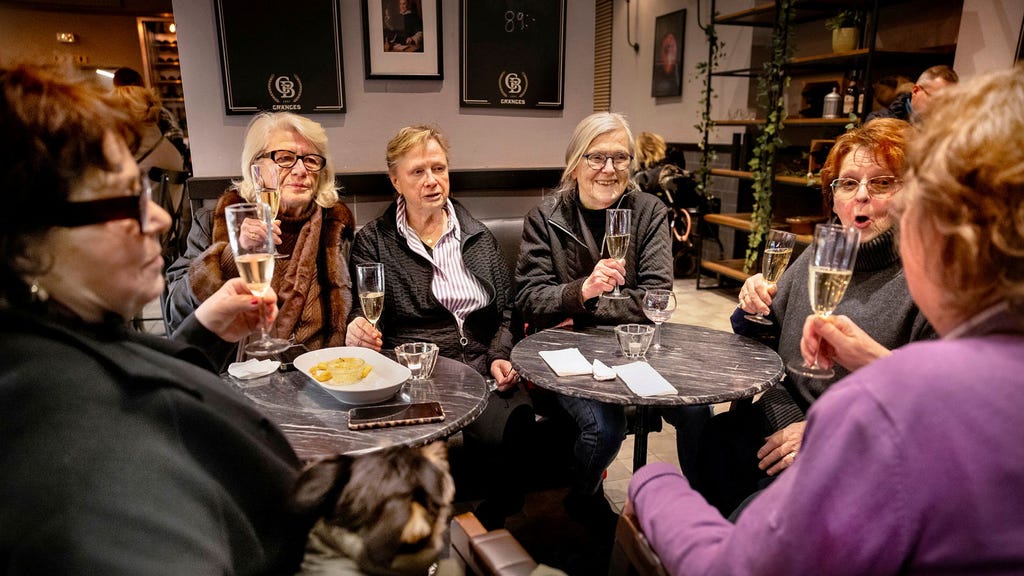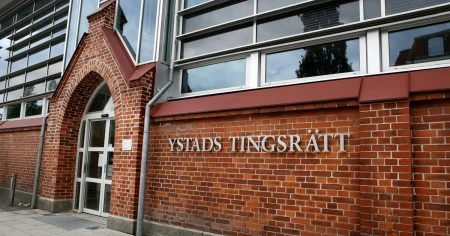Bar Uven, nestled on Hornsgatan in Stockholm, has become a haven for the 55-and-over crowd. Behind its lace curtains lies a sanctuary from the thumping music and boisterous energy of typical bars, offering instead a quiet refuge where conversations flow easily and prices remain refreshingly affordable. Opened just recently, the bar has rapidly gained popularity, its reputation spreading through word-of-mouth and social media. Patrons appreciate the low music volume, the absence of a younger crowd, and the relaxed atmosphere that encourages interaction, even across tables. This ambiance, coupled with budget-friendly prices – 29 kronor for a beer, 45 for house wine, and 39 for a smørrebrød – has resonated deeply with a demographic often overlooked by mainstream establishments.
The affordability factor is particularly significant for pensioners, many of whom find the high prices of typical bars prohibitive. Agneta Lagerwall, a regular at Uven, emphasizes the relief of enjoying a night out without the financial strain. The convivial atmosphere also fosters new connections. Lagerwall recounts arriving with a group of friends to find no available tables. Two women offered to share their space, and a new group of six was spontaneously formed, demonstrating the bar’s ability to connect individuals seeking companionship and community. This sense of belonging resonates deeply, offering an alternative to solitary evenings at home. The regulars at Uven express their delight in finding a place where they can socialize and forge new friendships.
However, this newfound haven comes with a touch of protectiveness. While praising the bar’s unique atmosphere, patrons also express a desire to keep it a hidden gem, jokingly suggesting negative reviews to deter newcomers. This sentiment underscores the value they place on this space specifically catered to their needs and preferences. The bar’s owner, Ahmet Özdemir, diligently enforces the age restriction, checking IDs at the door and politely turning away those who don’t meet the requirement. This strict adherence to the age limit reinforces the bar’s identity as a sanctuary for a specific demographic. The irony, not lost on some, is that Özdemir himself is younger than the bar’s minimum age, a detail he playfully downplays.
The bar’s success, particularly following a feature in the local newspaper Mitti, has taken Özdemir by surprise. The concept originated from a less successful wine bar, which then evolved into the current ’ölsjapp’ model. The age restriction was implemented to avoid competition with his adjacent bar, but the unexpected consequence has been the creation of a unique space that caters specifically to an older clientele. Özdemir initially envisioned a place where pensioners could gather and combat loneliness, a space where the ease of conversation and affordability fostered connection. This vision has resonated with patrons like Olof Risberg, who praises the respectful atmosphere and the consideration shown towards pensioners’ often limited budgets.
Risberg, though not yet retired, appreciates the bar’s unique ambiance and its affordability, jesting about the possibility of “getting drunk for 200 kronor.” He highlights the lack of need for security, humorously attributing it to the patrons’ age. The bar has also become an unlikely matchmaker, with patrons sharing life stories and even exchanging numbers. Özdemir acknowledges the bar’s potential for fostering romantic connections and notes that phone numbers have already been exchanged. He points to the contrast with the typical noisy pub environment, where meaningful connections are more challenging to forge. This alternative environment offers a more intimate setting where conversation and genuine connection are prioritized.
The bar’s success story illuminates the unfulfilled need for social spaces tailored to older adults. Patrons like Bengt Engström highlight the difficulty of communicating in noisy environments, emphasizing the strain on those with hearing aids. Uven provides a refreshing alternative, a quiet sanctuary where conversation flourishes. The heartwarming stories of new friendships, shared laughter, and even burgeoning romances testify to the bar’s impact. The genuine appreciation expressed by patrons, often moving Özdemir to tears, underscores the significance of this space. As the evening winds down and the lights brighten, regulars like Lagerwall and her friends make plans for their next visit, a testament to the community that has blossomed within Uven’s welcoming walls. Even the departure scene, with patrons thanking Özdemir and hurrying to their rides, leaves a lasting impression of a community that has found its place, a place where age is not a barrier but a defining characteristic of a shared experience.














